The Intel Kaby Lake-X i7 7740X and i5 7640X Review: The New Single-Threaded Champion, OC to 5GHz
by Ian Cutress on July 24, 2017 8:30 AM EST- Posted in
- CPUs
- Intel
- Kaby Lake
- X299
- Basin Falls
- Kaby Lake-X
- i7-7740X
- i5-7640X
Benchmarking Performance: CPU Encoding Tests
One of the interesting elements on modern processors is encoding performance. This includes encryption/decryption, as well as video transcoding from one video format to another. In the encrypt/decrypt scenario, this remains pertinent to on-the-fly encryption of sensitive data - a process by which more modern devices are leaning to for software security. Video transcoding as a tool to adjust the quality, file size and resolution of a video file has boomed in recent years, such as providing the optimum video for devices before consumption, or for game streamers who are wanting to upload the output from their video camera in real-time. As we move into live 3D video, this task will only get more strenuous, and it turns out that the performance of certain algorithms is a function of the input/output of the content.
All of our benchmark results can also be found in our benchmark engine, Bench.
7-Zip 9.2: link
One of the freeware compression tools that offers good scaling performance between processors is 7-Zip. It runs under an open-source licence, is fast, and easy to use tool for power users. We run the benchmark mode via the command line for four loops and take the output score.
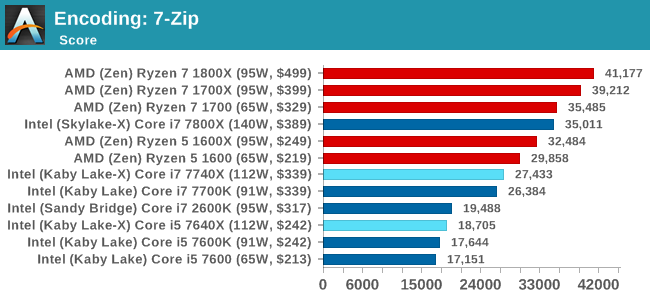
7z loves threads. 7z loves it.
WinRAR 5.40: link
For the 2017 test suite, we move to the latest version of WinRAR in our compression test. WinRAR in some quarters is more user-friendly that 7-Zip, hence its inclusion. Rather than use a benchmark mode as we did with 7-Zip, here we take a set of files representative of a generic stack (33 video files in 1.37 GB, 2834 smaller website files in 370 folders in 150 MB) of compressible and incompressible formats. The results shown are the time taken to encode the file. Due to DRAM caching, we run the test 10 times and take the average of the last five runs when the benchmark is in a steady state.
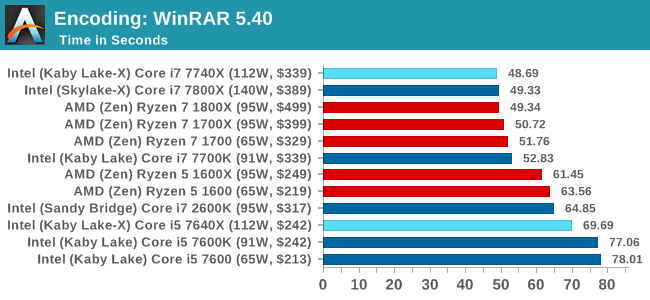
WinRAR is another benchmark like Agisoft, with some parts being serial and others multithreaded. When we compare the Core i7 to the Ryzen 7, the high ST performance helps push the Core i7 to the top despite the 2:1 thread deficit. On the other hand, the Core i5 has a 3:1 thread defecit to the Ryzen 5, and falls beneath it in the results.
AES Encoding
Algorithms using AES coding have spread far and wide as a ubiquitous tool for encryption. Again, this is another CPU limited test, and modern CPUs have special AES pathways to accelerate their performance. We often see scaling in both frequency and cores with this benchmark. We use the latest version of TrueCrypt and run its benchmark mode over 1GB of in-DRAM data. Results shown are the GB/s average of encryption and decryption.
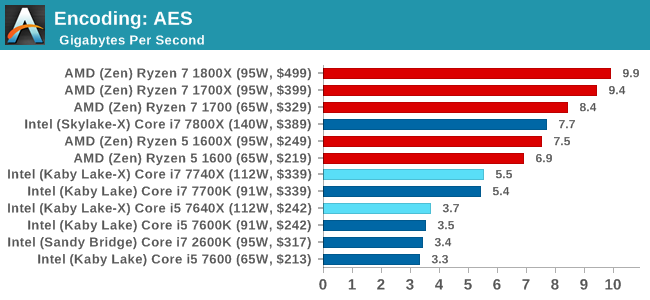
AES is an optimized problem for modern processors, so add frequency and cores to get a proportionally better result. Again, the Core i7-2600K and the Core i5-7640X are almost neck-and-neck.
HandBrake v1.0.2 H264 and HEVC: link
As mentioned above, video transcoding (both encode and decode) is a hot topic in performance metrics as more and more content is being created. First consideration is the standard in which the video is encoded, which can be lossless or lossy, trade performance for file-size, trade quality for file-size, or all of the above can increase encoding rates to help accelerate decoding rates. Alongside Google's favorite codec, VP9, there are two others that are taking hold: H264, the older codec, is practically everywhere and is designed to be optimized for 1080p video, and HEVC (or H265) that is aimed to provide the same quality as H264 but at a lower file-size (or better quality for the same size). HEVC is important as 4K is streamed over the air, meaning less bits need to be transferred for the same quality content.
Handbrake is a favored tool for transcoding, and so our test regime takes care of three areas.
Low Quality/Resolution H264: He we transcode a 640x266 H264 rip of a 2 hour film, and change the encoding from Main profile to High profile, using the very-fast preset.
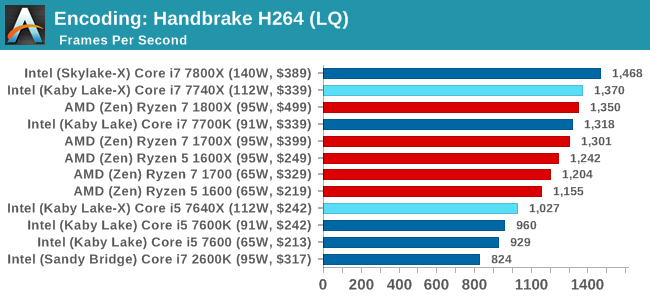
High Quality/Resolution H264: A similar test, but this time we take a ten-minute double 4K (3840x4320) file running at 60 Hz and transcode from Main to High, using the very-fast preset.
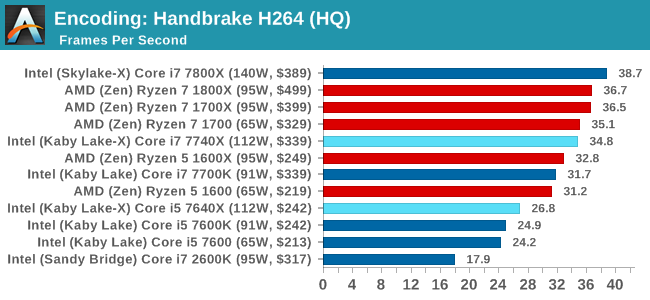
HEVC Test: Using the same video in HQ, we change the resolution and codec of the original video from 4K60 in H264 into 4K60 HEVC.
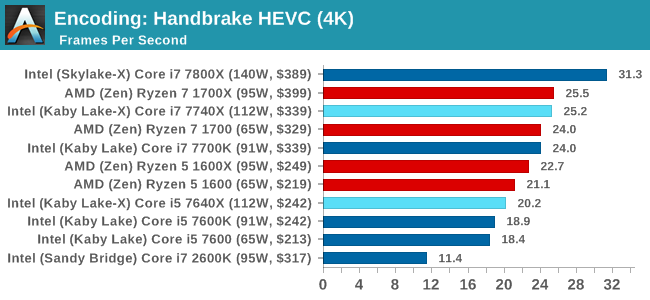










176 Comments
View All Comments
Ian Cutress - Monday, July 24, 2017 - link
*As specifically written down on that page and mentioned in the explanation for that benchmark*, GeoThermal Valley at 1080p on the GTX 1080 seems incredibly optimized: all the Core i5 chips do so much better than all the other chips.lixindiyi - Monday, July 24, 2017 - link
The frequency of Ryzen 7 1700 should be 3.0/3.7 GHz.Integr8d - Monday, July 24, 2017 - link
"After several years of iterative updates, slowly increasing core counts and increasing IPC, we have gotten used to being at least one generation of microarchitecture behind the mainstream consumer processor families. There are many reasons for this, including enterprise requirements for long support platforms as well as enterprise update cycles."You forgot 'milking their consumer, enthusiast and enterprise markets'...
Arbie - Monday, July 24, 2017 - link
Ian! You're a Brit - please help defend our common language. You meant to say "raises the question". "Begs the question" is totally different and does not even approximate what you intended.Journos: You don't have to understand "begs the question" because you'll very rarely need it. If you mean "raises the question" then just use that - plain English.
Mayank Singh - Monday, July 24, 2017 - link
Can someone explain how could the i5's could have got better performance than the i7 at 1080p?Ian Cutress - Monday, July 24, 2017 - link
Geothermal Valley on RoTR seems to be optimized for 1080p on a GTX 1080 and overly so, giving a lot more performance on that specific setup and test.Icehawk - Monday, July 24, 2017 - link
How is that possible? The i5 has slower clocks and less cache. So how can it be faster, "optimization" isn't valid here IMO unless I am missing something.I think you have a throttling issue or something else that needs to be examined. Monitoring long term clocks and temps is something that you need to look at incorporating if only to help validate results.
lucam - Monday, July 24, 2017 - link
When are you guys doing the iPad Pro review?dgz - Monday, July 24, 2017 - link
I remember a time when AT used to be a trustworthy. Who are you fulling, Ian? No one, that's who. Shame on you.Ian Cutress - Monday, July 24, 2017 - link
I've been called an AMD shill and an Intel shill in the space of two weeks. Fun, isn't it.